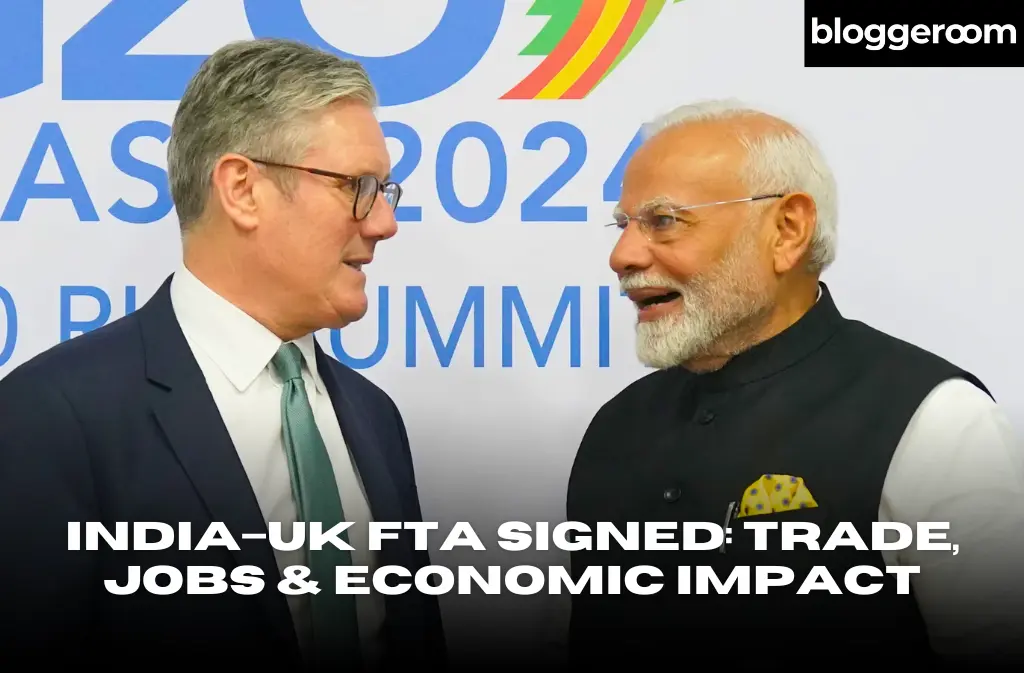India-UK FTA Signed: Trade, Jobs and Economic Impact
In a major development, Prime Minister Narendra Modi and UK Prime Minister Keir Starmer signed the long-awaited India-UK Free Trade Agreement (FTA) in London. This deal is expected to give a strong boost to trade, investment, and employment while strengthening the strategic ties between both countries.
This is India’s first full trade agreement with a European nation, and it’s expected to increase bilateral trade to $120 billion by 2030, with an estimated annual trade boost of $34 billion.
What Does the Agreement Include
The FTA reduces or removes taxes (tariffs) and makes it easier for both countries to do business with each other.
Key Highlights of the India-UK Agreement:
- Almost all Indian goods – around 99% – can now be exported to the UK without any tariffs.
- Most UK products coming into India will see a big drop in import duties, going from 15% down to just 3% on average.
- Scotch whisky from the UK will face a 75% import tax right away, which will gradually reduce to 40% over the next ten years.
- Cars imported from the UK will now be taxed at only 10%, making them more affordable in India.
- Indian industries like textiles, footwear, gems, processed foods, and auto parts will gain easier entry into the UK market.
- Indian professionals in specific sectors won’t have to pay UK national insurance, helping them keep more of what they earn.
Why Does This Deal Matter to India
- Export Growth – Indian exporters will gain easier access to a wealthy market. Sectors like textiles, leather, gems, and food processing are expected to see strong growth.
- Job Creation – The government estimates the FTA could generate over 1 million new jobs in the coming years, particularly in small and medium businesses.
- Support for MSMEs – Cities like Surat, Tiruppur, Ludhiana, and Jaipur, known for textiles and crafts, will benefit from increased demand.
- Increased Investment – UK-based firms are expected to invest more in manufacturing, clean energy, fintech, and education in India.
Advantages for India
- Duty-free market access: About 99% of Indian goods will now enter the UK without any import taxes, boosting exports in textiles, leather, and food products.
- Stronger service exports: India’s IT, education, and healthcare industries will enjoy easier access to UK clients, opening doors for higher revenues and collaborations.
- Boost to India’s global trade image: The deal reflects India’s growing credibility as a partner ready to engage in fair, high-standard international trade.
- Smoother job access for Indians: Skilled professionals from India – especially in areas like technology, healthcare, and finance – will find it easier to live and work in the UK, thanks to relaxed mobility rules and fewer paperwork barriers.
Disadvantages and Risks
- Carbon tax pressure: The UK’s upcoming carbon border tax on goods like steel, aluminium, and fertilizers may hit Indian exporters hard – potentially costing nearly $775 million every year.
- Tough compliance requirements: Smaller Indian businesses could struggle to meet the UK’s strict product standards, including rules on quality, safety, and environmental impact.
- Missing investment protections: The Bilateral Investment Treaty (BIT), which would safeguard investors on both sides, hasn’t been finalized – raising concerns for long-term UK investments in India.
- Competition from UK imports: Local industries, especially electronics and auto parts, may face pricing pressure as cheaper UK products enter the Indian market.
What Experts and Critics Are Saying
- Economists believe the FTA will only work if India also improves infrastructure and eases the cost of doing business.
- Trade analysts warn about the carbon tax and say the government must build a local carbon credit system to protect exporters.
- Opposition leaders have questioned the lack of a finalized investment treaty, calling it a risk for long-term investor trust.
How the Indian Government Plans to Maximize FTA Gains
- Managing carbon tax impact: The government is developing a domestic carbon credit system to help Indian exporters cope with the UK’s upcoming carbon border tax (CBAM).
- Speeding up investment protections: Efforts are underway to finalize the Bilateral Investment Treaty (BIT), which will give foreign investors more confidence and legal safeguards.
- Helping MSMEs meet UK standards: Special training programs and compliance support will be rolled out to help small Indian businesses adapt to the UK’s quality and sustainability rules.
- Keeping the deal on track: A dedicated task force will monitor how the FTA affects different sectors and quickly respond to any issues or disruptions.
Conclusion
The India-UK trade deal is a big step forward in India’s global trade ambitions. It opens up new opportunities for exports, jobs, and investments. But its real success will depend on how well India helps small businesses adapt and handles challenges like carbon taxes. If managed well, this agreement could give India a stronger voice in international trade.







